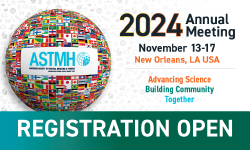| Past two years | Past Year | Past 30 Days | |
|---|---|---|---|
| Abstract Views | 1626 | 756 | 47 |
| Full Text Views | 31 | 9 | 0 |
| PDF Downloads | 30 | 14 | 0 |
Recovery of Dengue Viruses from Patients during Epidemics in Puerto Rico and East Pakistan
Search for other papers by Philip K. Russell in
Current site
Google Scholar
PubMed
Search for other papers by Edward L. Buescher in
Current site
Google Scholar
PubMed
Search for other papers by Jack M. McCown in
Current site
Google Scholar
PubMed
Search for other papers by José Ordoñez in
Current site
Google Scholar
PubMed
Summary
Viruses, closely related if not identical to dengue virus type 3, were recovered from the acute phase bloods of persons with clinical dengue fever in outbreaks in Puerto Rico (1963) and East Pakistan (1964). Because viruses from each epidemic induced little if any overt disease upon inoculation of suckling or weanling mice, the recovery and identification of these viruses were dependent entirely upon cell culture techniques using the challenge virus resistance test. Monolayer cultures of primary African green monkey kidney (GMK) cells, or continuous heteroploid GMK cells (BS-C-1) were found to be more sensitive for detection of dengue viruses than was the diploid early passage BS-C-1 cell. Titrations of newly recovered viruses were regularly and reproducibly made in the former cells. Titers of cell culture propagated dengue viruses were too low to permit demonstration of complement fixing or hemagglutinating antigen, but adequate for performance of neutralization tests to identify newly recovered strains. The techniques ultimately developed for recovery and characterization of dengue viruses in the GMK cell culture system are described.
Author Notes
Present addresses: Department of Virology, SEATO Medical Research Laboratory, Bangkok, Thailand (PKR) and Departmento de Medicina Preventiva, Facultad de Ciencias Medicas, Universidad de San Carlos, Guatemala, Guatemala (JO). Please address reprint requests to the Department of Virus Diseases, Walter Reed Army Institute of Research.
| Past two years | Past Year | Past 30 Days | |
|---|---|---|---|
| Abstract Views | 1626 | 756 | 47 |
| Full Text Views | 31 | 9 | 0 |
| PDF Downloads | 30 | 14 | 0 |








